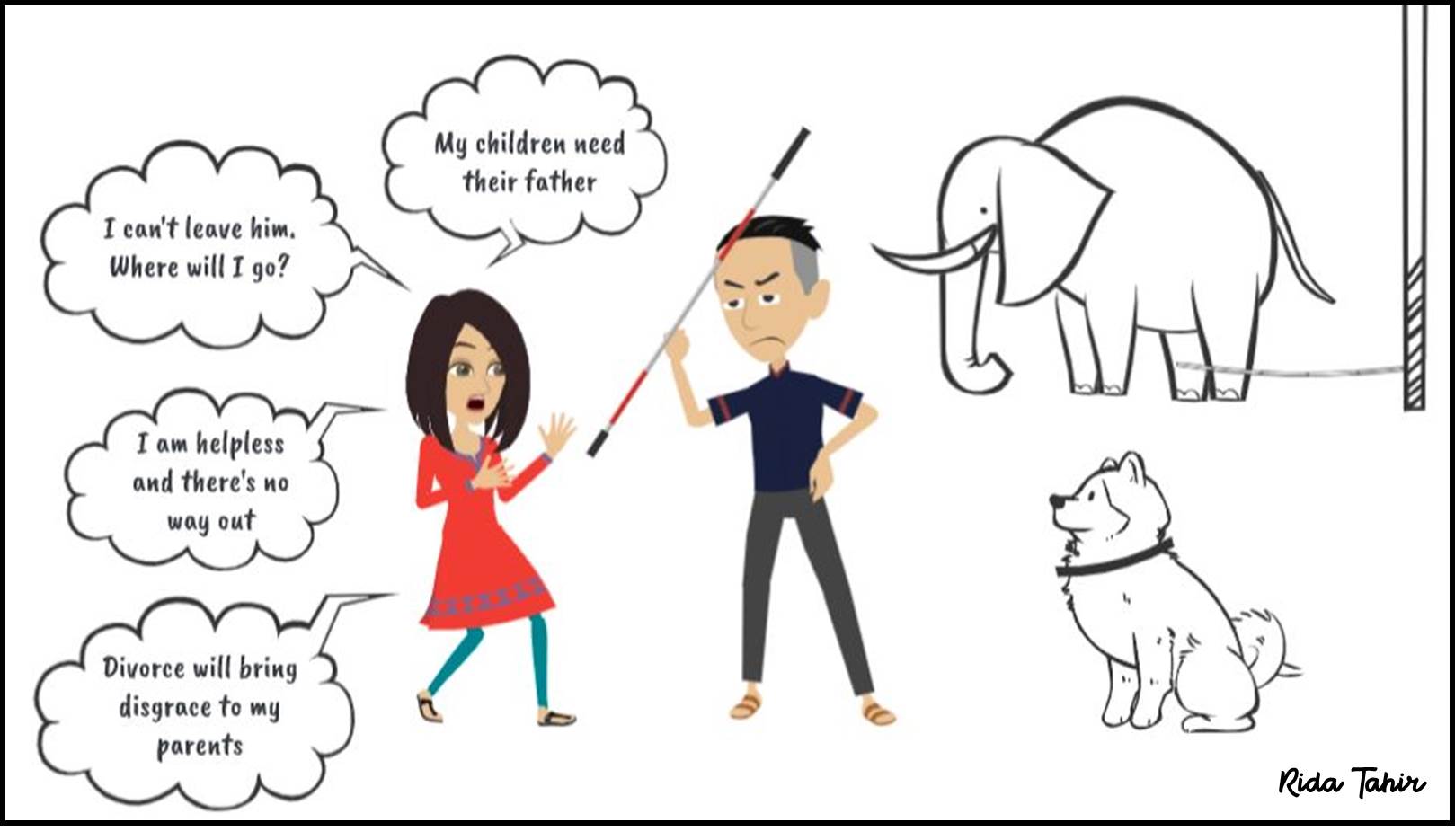Learned Helplessness: Why Women
Stay in Abusive Marriages
Written by Rida Tahir on Jan 15, 2021 (5 min read)


Sometimes we are trapped in situations that we need to escape from, or we have a problem we're trying to solve or a goal that we want to accomplish, but in trying to do so and failing repeatedly, we exhaust ourselves at a certain point and lose all hopes of freedom or success. From that point onwards, we start believing that we are never going to escape that situation, that the problem is never going to be solved and the goal will probably never be achieved. That's when we stop trying. This feeling of powerlessness and the ceasing of effort is what is called learned helplessness, because we have, quite literally, "learned to be helpless" or conditioned into believing that we are helpless.
This means that it IS possible to escape the situation, solve that problem and achieve that goal, and we DO have the ability to do so, but BECAUSE we have given up all hope and stopped trying, we remain trapped, the problem remains unresolved and the goal unaccomplished. This also means that we are responsible for our own misery, for our unresolved problems and for our unfulfilled dreams and goals, at least in some situations, if not all.
Martin Seligman, the American psychologist who developed the theory of learned helplessness and coined the term "Learned Helplessness", experimented on dogs, gave them electric shocks and noticed that some dogs didn't even try to escape the shocks when they could, because they had learned that all their efforts to escape the shocks will fail as they failed in the past. In other words, they had been conditioned to believe that they couldn't escape.
This phenomenon has been observed in other animals as well. Have you heard of The Elephant Syndrome? Elephant trainers around the world tie baby elephants to a pole or a tree with a rope or chain, who initially try their best to escape but after failing repeatedly, they give up and stop trying to escape. When they grow up into adult elephants, they are powerful and strong enough to uproot trees and knock down walls, yet when tied to a rope or chain like they were earlier, they don’t try to escape because they have learned that their efforts will be futile and escape is impossible.
But we are not dogs or elephants. So let me give you a human example.
The most common and prevalent example of learned helplessness in humans that we all have observed around us is how women who are in abusive marriage don’t try to escape or don’t leave when they can. They don't leave because the escape seems impossible to them due to so many barriers like having small children, being financially dependent on husband, lack of courage to raise their voice and stand up for their rights, fear of the society, the taboo of divorce and stereotypes associated with divorced women, lack of education and skills to earn a living for themselves, etc. So they just stop trying to change their circumstances and accept their life of misery and console themselves by reframing their situation as a test or punishment from God.
Does that mean a woman stuck in an abusive marriage is responsible for her misery? Yes and no.
Yes, because she CAN change her circumstances if she makes the choice, but she chooses not to, because of xyz reasons.
No, because the support system is lacking and that isn't her fault. Society is a system where everything is interconnected and everything affects and is affected by everything else. Unfortunately, we are living in a society that's hostile towards divorced women, a society that allows the abusers to get away and pushes women to suffer in silence, which is proof of our flawed value system and our failed government. There is no monetary or institutional support from the government for divorced women, women in our society cannot easily rent a house to live alone and hostels aren't generally trusted by the general public. Even parents care more about the society than their own daughter, that's why they refuse to take the poor woman in when she decides to end her marriage.
Speaking of the example of abusive marriages, I think parents, especially fathers, not only need to provide good education to their daughters and make sure they are financially independent before committing to a marriage, but they also need to teach their daughters not to tolerate abuse in any case and reassure them when they get married by saying, "This is your house. We are your parents, your protectors. We will always be there for you. You can always count on us. You can always come back. Our doors will always be open for you. You are not a burden on us, you are our most valuable treasure".
Apart from being financially independent, when a woman will be sure that her family has her back and will not abandon her and that she won't be a burden on her parents, it will be easier for her to leave an abusive marriage.
Just like it was for me. I was able to escape an abusive marriage in my early twenties because I had support of my family, I knew I could go back and start over. And so I said no to abuse and went back to my parents who welcomed me with open arms and helped me start a new life with new hopes in my heart, new dreams in my mind and a world full of possibilities. That's the reason I was able to cope with divorce the way I did and move on with my life without long-lasting psychological trauma.